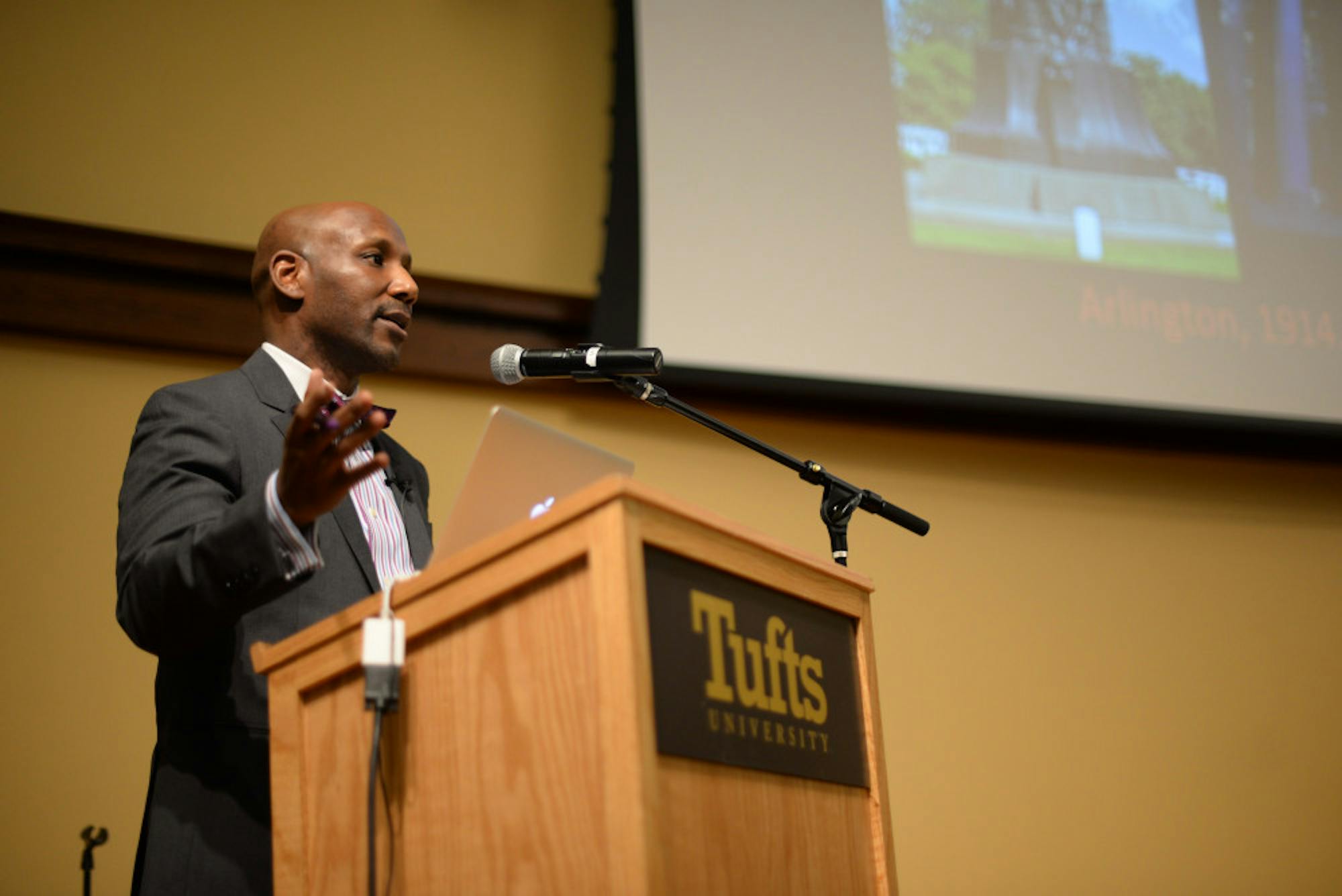MIT history professor Craig Steven Wilder was featured as this year's Africana Distinguished Lecture at Breed Memorial Hall last night, where he explored the relationship between racist visual imagery, protest and the American university system. The event was sponsored by a total of nine departments and centers, including the Africana Center and the Center for the Study of Race and Democracy (CSRD).
Before the lecture, the CSRD offered a bus tour of the Tufts Black Freedom Trail. The tour included several sites that reflect the racial history of Tufts and Medford, including the Royall House, Slave Quarters and other sites connected to abolitionism and the African American community of West Medford, according to the program’s brochure.
“Tufts itself sits on the middle of what was once a slave plantation," H. Adlai Murdoch, director of Africana Studies, said. "This is not generally known or as well known as it should be. Part of our goal with this will be to bring this [knowledge] more into the public domain and discuss what some of its ramifications are.”
CSRD Interim Director Kendra Field explained the tour’s purpose later during the lecture, in her introduction of Wilder.
“Students are here for four years and then they go, so we’re really interested in building historical memory and institutional memory as well,” she said.
At the lecture, Wilder discussed his book, "Ebony and Ivy: Race, Slavery, and the Troubled History of America's Universities."
The topic is particularly relevant given recent demonstrations questioning university institutions named after racist or slave-owning figures of American history, including protests to rename Calhoun College at Yale University and the Woodrow Wilson School of Public and International Affairs at Princeton University.
“From the very beginning of the American college [system] the relationship between colleges, conquest, and slavery is set,” Wilder said.
While opponents often object to student protesters on the grounds of tradition, Wilder said that racist imagery and institutions are rooted in protests.
“A lot of the visual culture of the American campus in fact has these deeply historical and racialized themes [and] many of them began as protest themselves,” he said.
 An archival exhibit of the public history of slavery and freedom in Medford that was created by CSRD students is displayed in Breed Memorial during the Africana Center's Distinguished Lecture with author Craig Wilder on Feb. 11, 2016. (Sofie Hecht / The Tufts Daily)
An archival exhibit of the public history of slavery and freedom in Medford that was created by CSRD students is displayed in Breed Memorial during the Africana Center's Distinguished Lecture with author Craig Wilder on Feb. 11, 2016. (Sofie Hecht / The Tufts Daily)Wilder spent much of his talk focusing on Dartmouth College. He explained that in 1934, Mexican muralist José Clemente Orozco painted a provocative mural at Dartmouth which implicitly criticized the detrimental effects of industrialization, colonization and the conquest and degradation of indigenous people that helped create America. The Dartmouth community of students and parents protested what it argued was a threat to its traditions, he said.
In response, Dartmouth alumnus and artist Walter Humphrey persuaded the university president to allow him to paint what would become Dartmouth's Hoveymurals, he said. The paintings were a series of racist drawings of native Americans, which depicted indigenous people as a drunken, sexually-loose and unenlightened. Wilder spoke about this example to explain how this racist imagery, which would later be protested by Native American students at Dartmouth in 1971, was actually a form of protest against a more progressive trend.
“The rebel yell of the American academy [against protesters] is tradition," Wilder said. "That’s ridiculous. Much of [Humphrey's counterprotest] was racist protest."
The CSRD also used Wilder’s talk as an opportunity to talk about Tufts history. At the event’s venue, a photo gallery displayed notable moments in Tufts racial history.
The lecture was followed by a student-led dialogue and dinner about race, class and college campuses today at the CSRD, according to the Facebook event.
Wilder ended his lecture with a challenge to students and faculty at universities across the country.
“Every university on this planet has an obligation to have an open, honest dialogue about its history," he said. "Colleges and universities are the last places that we should be afraid of our own past.”






